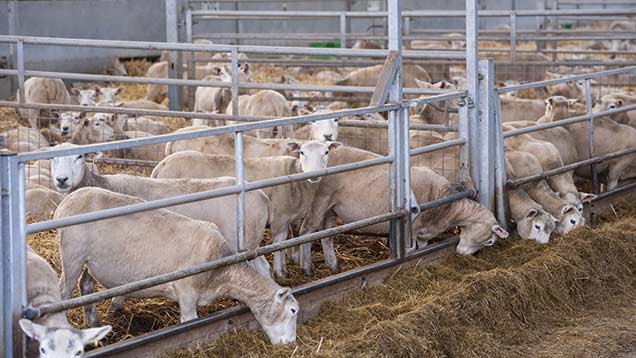Alternative ewe protein offers cost-effective solution
 (c) John Eveson/FLPA/Rex
(c) John Eveson/FLPA/Rex Sheep farmers looking to top up protein in late-pregnancy ewe diets can use alternatives to soya without affecting animal performance.
According to a project funded by Eblex, HCC, Adas and Reaseheath College there were no significant differences in animal performance between soya and alternative protein diets (see table one).
Liz Genever, Eblex senior livestock scientist, says getting protein levels right in the last three weeks of pregnancy is important for udder development and milk production (see table two).
“Ewes need rumen-degradable protein [RDP] daily. It is found in grass, hay, silage and green, leafy brassicas.
And while RDP is usually enough to meet the ewe’s protein requirements, in late pregnancy, due to reduced rumen capacity as foetuses grow and an increased need for protein, this often cannot be met from RDP in forage alone.”
Soya is usually used to boost high-quality protein levels in diets for late pregnancy and lactation, but it can be costly for the producer, says Dr Genever.
“But findings from this project show alternative sources to soya can be used without affecting animal performance, with the soya-based diet the most expensive and wheat distillers’ dark grains the cheapest,” she says.
Table 1: Summary of results from the protein sources and TMR feeding research project
|
Diet |
Average BCS at lambing |
Average birth weight (kg) |
Adjusted 56 day lamb weight (kg) |
Total feed cost (£/head) |
|
Soyabean meal with cereals |
3.0 |
4.4 |
23.6 |
2.96 |
|
Rapeseed meal with cereals |
3.0 |
4.6 |
23.9 |
2.61 |
|
Wheat distillers’ dark grains (WDDG) with cereals |
3.2 |
4.3 |
23.0 |
2.57 |
|
Field beans with cereals |
3.2 |
4.2 |
23.8 |
2.66 |
|
Rapeseed meal with fodder beet |
3.1 |
4.6 |
23.1 |
2.62 |
|
WDDG with fodder beet |
3.1 |
4.2 |
22.4 |
2.82 |
Table 2: Metabolisable protein requirements of housed, pregnant ewes of different weights and litter size
|
Weeks pre-lambing |
|||||
|
7 |
5 |
3 |
1 |
||
|
Ewe weight |
No of lambs |
||||
|
50kg |
1 |
72 |
76 |
81 |
88 |
|
2 |
77 |
83 |
92 |
103 |
|
|
60kg |
1 |
80 |
84 |
90 |
98 |
|
2 |
85 |
92 |
102 |
115 |
|
|
70kg |
1 |
87 |
92 |
98 |
107 |
|
2 |
93 |
101 |
112 |
126 |
|
|
3 |
96 |
106 |
119 |
136 |
|
|
80kg |
1 |
94 |
99 |
107 |
116 |
|
2 |
100 |
109 |
122 |
137 |
|
|
3 |
104 |
115 |
129 |
148 |
|
| Table from Eblex. Speak to a nutritionist to calculate MP supply. | |||||
